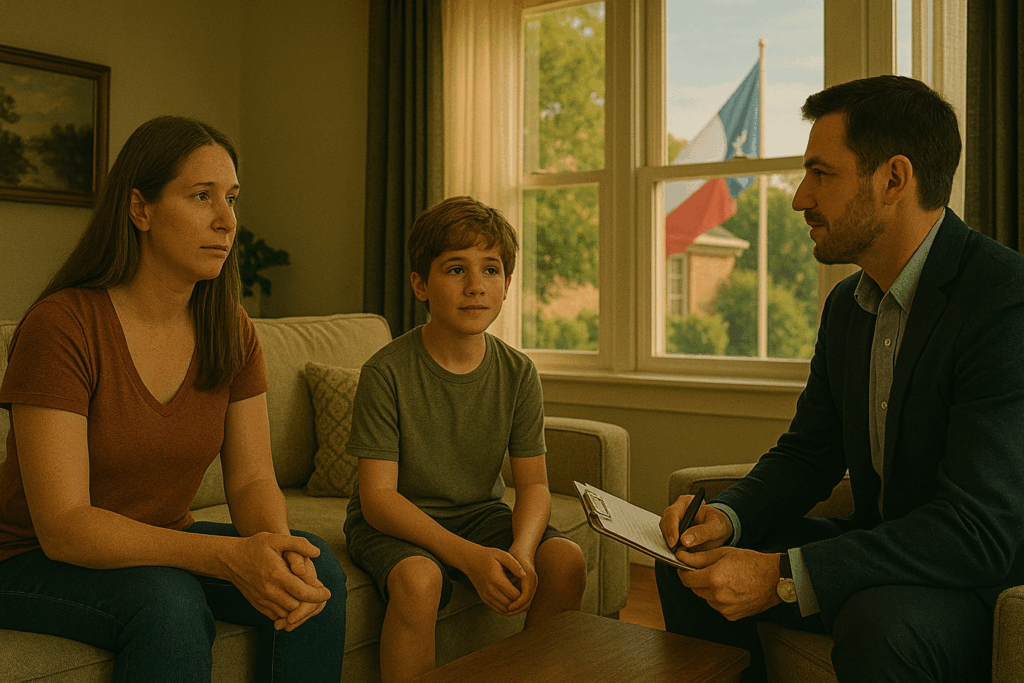
It started with a sock. Just one, lying on the kitchen counter. Not on the floor, not in the hamper—on the counter. And somehow, that sock turned into a full-blown argument about routines, respect, and whose week it was to take the dog to the groomer. Sound familiar? For parents going through a divorce, it’s never really just about the sock. It’s about the deeper question: Who’s providing stability at home when everything else feels up in the air? That’s exactly where Local Texas Custody Evaluation Services come into play—they help the court see beyond the chaos and determine what’s truly best for your child.
In this blog, we’re unpacking what these evaluations actually involve, why they matter, and how they can influence your custody outcome in Texas. You’ll get a clear understanding of how evaluators assess parenting styles, home environments, and emotional dynamics—and why your cooperation, consistency, and yes, even where the laundry ends up, could shape your child’s future living arrangement.
We’ll also share practical tips you can use right now to prepare, real-life case insights from families just like yours, and guidance from the experienced attorneys at The Law Office of Bryan Fagan, PLLC. If you’re navigating custody in Texas and want to make sure your side of the story is told clearly, fairly, and with your child’s best interest at heart, keep reading. This isn’t just legal advice—it’s about protecting your future and your family’s peace of mind.
Key Takeaways
- Child custody evaluations are comprehensive assessments designed to determine custody arrangements that prioritize the child’s welfare, involving interviews, home visits, and document reviews.
- Local Texas evaluators provide key advantages such as understanding legal standards, quicker scheduling, and familiarity with community dynamics, streamlining the evaluation process.
- Proper preparation for a custody evaluation includes creating a supportive home environment, honest communication with the evaluator, and avoiding coaching the child to ensure accurate assessments.
What Are Local Texas Custody Evaluation Services?
At the center of many Texas custody disputes are evaluations conducted to determine what arrangement best supports the child’s welfare, as outlined in Texas Family Code § 153.004. These evaluations typically include interviews with both parents and the child, home visits, observation of family dynamics, and a review of relevant records. As we’ve seen in our work with Texas families, these assessments often shape the court’s final decision regarding conservatorship, visitation, and parental rights. A well-prepared parent can meaningfully influence the evaluator’s findings, which ultimately guide the judge’s ruling.
A major update to the law occurred in September 2023 with the enactment of Texas Family Code § 107.109, requiring audiovisual recordings of all child interviews during custody evaluations. According to our family law team, this measure increases fairness and transparency by allowing the court to directly review the child’s statements rather than relying solely on summaries. This change helps reduce bias and protects children from being misquoted or misunderstood during this sensitive process.
Local Texas Custody Evaluation Services are often provided by licensed mental health professionals, such as psychologists, LPCs, or clinical social workers, who meet the standards under Texas Family Code § 107.104. These evaluators must have specific family law training and are typically familiar with the expectations of local courts and judges. Our legal professionals have helped many clients select qualified local evaluators who bring both legal insight and practical experience, making the evaluation smoother and more effective.
To better understand how these evaluations influence custody decisions, we recommend reading Factors That Shape Custody Evaluation Outcomes. For more hands-on guidance, our attorneys also suggest exploring How to Prepare for a Texas Custody Suit. At The Law Office of Bryan Fagan, PLLC, we remain committed to educating families and protecting futures—one case at a time.

Benefits of Using Local Texas Custody Evaluation Services
Local Texas Custody Evaluation Services offer several key advantages for families navigating conservatorship issues under the Texas Family Code. As our attorneys frequently advise, selecting a local evaluator often means working with professionals who are familiar with the preferences and procedures of the judges in your specific county. This insight helps ensure the evaluation process complies with regional court expectations, aligning with Texas Family Code §§ 107.104–107.109, which outline evaluator qualifications, procedures, and recent legislative updates—including the requirement for audiovisual recordings of child interviews, effective as of September 2023.
Local evaluators can often schedule assessments faster than larger or out-of-area agencies. In urgent cases, such as those involving emergency custody modifications or concerns related to child support and medical care, expedited evaluations can provide families with timely access to legal proceedings. According to our family law team, this can be especially critical in high-conflict or high-stakes custody matters where delayed decisions may negatively impact a child’s safety or well-being.
Another benefit of using local professionals is their understanding of the community’s cultural, social, and economic dynamics—factors that are highly relevant under Texas Family Code § 153.002, which directs courts to always act in the child’s best interest. As we’ve seen in our work with Texas families, a custody evaluator with this community awareness can offer more accurate, well-rounded insights into family functioning and child needs. Additionally, their proximity allows for easier home visits and better coordination with attorneys and courts, leading to more comprehensive and reliable evaluations.
To help you prepare for your evaluation and improve communication throughout the process, our legal professionals recommend reviewing this resource on working with child custody evaluators. You can also explore our detailed guide on how custody evaluations unfold in Texas, which explains your rights and responsibilities every step of the way. At The Law Office of Bryan Fagan, PLLC, we remain committed to guiding Texas families with clarity, compassion, and legal excellence.

What to Expect from a Custody Evaluation
Child custody evaluations are comprehensive investigations aimed at determining the best custody arrangements for the child, including parenting plans. Key components include:
- Personal interviews with both parents and the child
- Providing the evaluator with insights into family dynamics
- Assessing parenting capabilities
- Understanding the child’s needs and preferences.
Home visits are also crucial. During these home visit evaluations, evaluators:
- Assess the safety and suitability of each parent’s home environment, ensuring it meets the child’s needs, including considerations for the other parent and the parent’s living situation, as well as the parent’s home.
- Observe parent-child interactions to evaluate the quality of the parent child relationship.
- Evaluate the parent’s ability to provide a nurturing and stable environment, including the potential for supervised visitation and parenting time.
Custody evaluations also involve a thorough review of relevant documentation, including medical and psychological evaluation histories, school records, and previous court orders. Interviews with third parties, such as teachers, doctors, and family friends, may be conducted to gather additional perspectives on the child’s life and well-being.
The evaluation process involves the following key points:
- It can last several months to over a year, depending on the case’s complexity.
- During this time, parents must cooperate fully with the evaluator and remain open and honest about their circumstances.
- Any additional evaluation services required after the initial investigation will need a new court order, ensuring thoroughness and fairness.
Preparing for Your Child Custody Evaluation
Preparing for a custody evaluation is one of the most critical steps in any conservatorship case under Texas Family Code § 107.109, which governs evaluation procedures and now requires audiovisual recordings of all child interviews—a major update designed to enhance transparency and fairness. As our attorneys frequently advise, the evaluator’s report often holds significant weight in the judge’s final decision, making it essential to present a home environment that reflects your commitment to your child’s physical and emotional well-being. This includes maintaining a clean and organized space, securing age-appropriate safety measures, offering adequate food, and ensuring appropriate sleeping arrangements—all of which align with the court’s focus on the child’s best interests as defined in Texas Family Code § 153.002.
Beyond physical space, your child’s emotional security is equally vital. Establishing a consistent daily routine, offering reassurance, and encouraging open communication can help your child feel safe and supported throughout the evaluation process. According to our family law team, children who are not overly coached and who feel genuinely heard are more likely to express themselves authentically—something evaluators carefully assess when forming their recommendations. If your child is already working with a licensed therapist, their involvement may offer helpful insight into ongoing emotional or behavioral challenges that could influence the evaluator’s findings.
Local Texas Custody Evaluation Services bring added advantages to this process. These professionals often have strong connections to the courts in your jurisdiction, are familiar with county-specific expectations, and can schedule evaluations more promptly than out-of-area providers. As we’ve seen in our work with Texas families, this local knowledge and accessibility often results in a smoother, less stressful experience for both parents and children, while still meeting the legal standards laid out in Texas Family Code §§ 107.104–107.111 regarding evaluator qualifications, disclosures, and reporting.
To learn more about how to prepare your home and family for this process, we recommend reviewing Getting Yourself Ready for a Home Study. You may also find our Texas Custody Evaluation Process guide helpful as you navigate each step. Our legal professionals have helped many clients understand what evaluators look for and how to avoid common pitfalls—and we’re here to help you do the same with compassion and confidence.

Cooperating with the Evaluator
As our attorneys frequently advise, honesty and respect are two of the most powerful tools you can bring into a custody evaluation. Evaluators appointed under Texas Family Code § 107.109 are tasked with making detailed recommendations that may heavily influence the court’s decisions on conservatorship, visitation, and parental rights. Demonstrating truthful communication and sincere cooperation allows evaluators to develop an accurate understanding of your family environment, which contributes to fair and balanced recommendations aligned with your child’s best interests as emphasized in Texas Family Code § 153.002.
A respectful and collaborative attitude throughout the evaluation process not only reflects positively on you as a parent but also helps establish trust with the evaluator. When working with Local Texas Custody Evaluation Services, it’s especially important to provide complete, accurate information and remain engaged and cooperative. These local professionals often have a strong understanding of your community’s unique social dynamics and judicial preferences, which can add meaningful context to their findings and ensure your case is evaluated thoroughly and fairly.
According to our family law team, the most productive evaluations occur when both parents remain focused on what matters most: the child’s well-being. By approaching each interaction with openness and emotional maturity, you help the evaluator see a clear and realistic picture of your parenting style, home life, and relationship with your child. This, in turn, equips the court to make informed decisions rooted in the specific needs of your family.
For a deeper understanding of your rights, responsibilities, and how to prepare for custody proceedings, we recommend reading our comprehensive guide on Texas child custody laws. You may also want to explore our Texas Child Custody Attorney page for more insights into how our team can help you navigate evaluations, legal filings, and courtroom procedures with confidence. At The Law Office of Bryan Fagan, PLLC, we are here to advocate for your family’s future—through honesty, compassion, and trusted legal experience.
Avoiding Coaching Your Child
Avoid coaching your child during a custody evaluation. Attempting to influence their statements can backfire and negatively impact your case. Instead, create an environment where your child feels safe and supported to express their thoughts and feelings openly.
Encourage your child to be honest and assure them that their opinions and feelings matter. This honesty gives the evaluator a genuine understanding of the child’s perspective, crucial for making informed recommendations.
Evaluators are trained to detect coaching, and any attempts to manipulate your child’s testimony can ultimately harm your case.
Finding Trusted Local Texas Custody Evaluation Services
Finding reliable custody evaluation services in Texas—especially in counties like Dallas—can feel overwhelming for parents navigating a stressful chapter of their lives. However, Local Texas Custody Evaluation Services are accessible through trusted channels, including approved evaluator lists maintained by county courts. These evaluators must meet the requirements set out in Texas Family Code § 107.104, which outlines qualifications such as specific education, experience, and family law training. As our attorneys frequently advise, starting with your county’s court-approved list ensures you’re working with professionals already vetted to meet the legal and ethical standards required in family law matters.
Family law attorneys are another indispensable resource when choosing a custody evaluator. Our legal professionals have helped many clients connect with experienced evaluators who not only meet state-mandated qualifications but also understand the nuances of working with Texas families. This includes familiarity with county-specific judicial preferences, as well as the ability to complete evaluations in a timely and sensitive manner. Evaluators may also be found through reputable sources such as the Texas Psychological Association, local bar associations, and family-focused mediation or parenting coordination centers.
Choosing a professional with both legal compliance and local knowledge is key. Evaluators who understand the social, cultural, and economic dynamics of your community can offer more relevant insights into family relationships, parenting capabilities, and child well-being. This is especially important in light of recent updates to the Texas Family Code—specifically § 107.109, which now mandates audiovisual recordings of child interviews during evaluations to promote transparency and accountability. As we’ve seen in our work with Texas families, local evaluators who are deeply rooted in their communities tend to conduct more meaningful home visits and offer contextually appropriate recommendations that courts find valuable.
For a clear, detailed overview of how evaluations work and how to prepare, we encourage you to read Texas Custody Evaluation Process Explained Clearly. You can also visit our in-depth guide on what to expect during a Texas child custody case. At The Law Office of Bryan Fagan, PLLC, we are committed to guiding you through the custody evaluation process with empathy, legal clarity, and a steadfast focus on your child’s best interests.

How the Law Office of Bryan Fagan Can Help
Navigating a child custody evaluation can be overwhelming, but you don’t have to face it alone. Local Texas Custody Evaluation Services often play a crucial role in conservatorship decisions, and partnering with a law firm that understands the full process is essential. According to our family law team, being prepared not only helps present your parenting strengths clearly but also ensures your child feels supported during this emotional experience. Our attorneys guide you through each step—helping with documentation, preparing for interviews, and coordinating with evaluators—all in accordance with Texas Family Code §§ 107.104–107.109, which set standards for evaluator qualifications and procedures, including the 2023 update requiring audiovisual recordings of all child interviews.
Our legal professionals have helped many clients understand how to navigate evaluations confidently and with clarity. We assist in identifying any areas of concern, crafting appropriate responses, and ensuring your home environment aligns with the court’s expectation of serving the child’s best interest under Texas Family Code § 153.002. From communication strategies to emotional support, our team ensures you’re prepared for every phase of the evaluation, combining legal insight with compassionate counsel tailored to your unique family situation.
As we’ve seen in our work with Texas families, outcomes are strongest when legal advocacy is paired with insight into local evaluation practices. That’s why we work closely with Local Texas Custody Evaluation Services—professionals who not only meet the legal requirements but also understand the cultural and judicial dynamics of the communities they serve. Our experienced attorneys ensure this collaboration is seamless and strategic, always putting your family’s long-term well-being first.
To learn more about how our team supports parents in custody evaluations, explore our full page on Texas child custody attorneys or read our in-depth article explaining the Texas custody evaluation process. At The Law Office of Bryan Fagan, PLLC, we are here to educate, advocate, and protect your family’s future with the care and excellence you deserve.
Conclusion:
Custody evaluations can feel overwhelming—like one more puzzle piece in an already complicated chapter of your life. But they’re also an opportunity. A chance to show the court the life you’re building for your child, the love you give daily, and the stability you’re working hard to maintain—even when the road feels bumpy.
The truth is, these evaluations aren’t just about paperwork or home inspections. They’re about real moments: bedtime routines, tough conversations, pancake breakfasts, and yes, even the occasional sock on the counter. They’re about your story, your parenting, and your commitment to your child’s well-being.
If you’re facing a custody evaluation or just wondering how the process might unfold, know this: you don’t have to do it alone. Working with a knowledgeable Texas family law attorney—especially one who understands how local courts operate—can make all the difference. At The Law Office of Bryan Fagan, PLLC, we’ve helped thousands of parents across Texas feel more confident, more prepared, and more empowered every step of the way.
So take a breath. You’ve got this. And when you’re ready, we’re here to help you turn the page toward a stronger future—for you and your child. Ready to talk? Let’s connect.
Texas Child Custody Frequently Asked Questions
How much does a child custody evaluation cost in Texas?
Child custody evaluations in Texas typically cost between $2,500 and $15,000 depending on the complexity of the case, whether the evaluator is court-appointed or private, and the scope of psychological testing involved.
What is the biggest mistake in custody battle?
The biggest mistake in a custody battle is failing to put the child’s needs first. This includes badmouthing the other parent, refusing to cooperate with court orders, or ignoring your child’s emotional well-being.
What do judges look at when deciding custody in Texas?
Judges in Texas consider the best interests of the child, including each parent’s involvement in the child’s life, the home environment, the child’s preferences (if age 12 or older), and any history of abuse, neglect, or substance misuse.
What makes a parent unfit for custody in Texas?
A parent may be deemed unfit for custody in Texas if they have a history of child abuse, neglect, domestic violence, untreated mental illness, chronic substance abuse, or if they cannot provide a safe and stable home.
What questions are asked in a custody evaluation?
Custody evaluators ask about parenting roles, discipline styles, daily routines, the parent-child relationship, mental and physical health, co-parenting dynamics, and any concerns about the other parent’s behavior or lifestyle.
What looks bad in a custody case?
Negative behaviors in custody cases include interfering with the child’s relationship with the other parent, violating court orders, unstable living conditions, poor communication, or displaying anger, manipulation, or hostility in front of the child.
How to win a custody battle against a narcissist?
To win custody against a narcissist, document everything, stay calm in court, follow all legal instructions, focus on your child’s needs, and work with an experienced family law attorney who can expose patterns of manipulation or emotional harm.
What is the definition of an unstable parent?
An unstable parent is one who cannot consistently provide emotional support, financial stability, or a safe living environment for their child. Instability may involve frequent moves, poor judgment, erratic behavior, or untreated addiction or mental illness.





